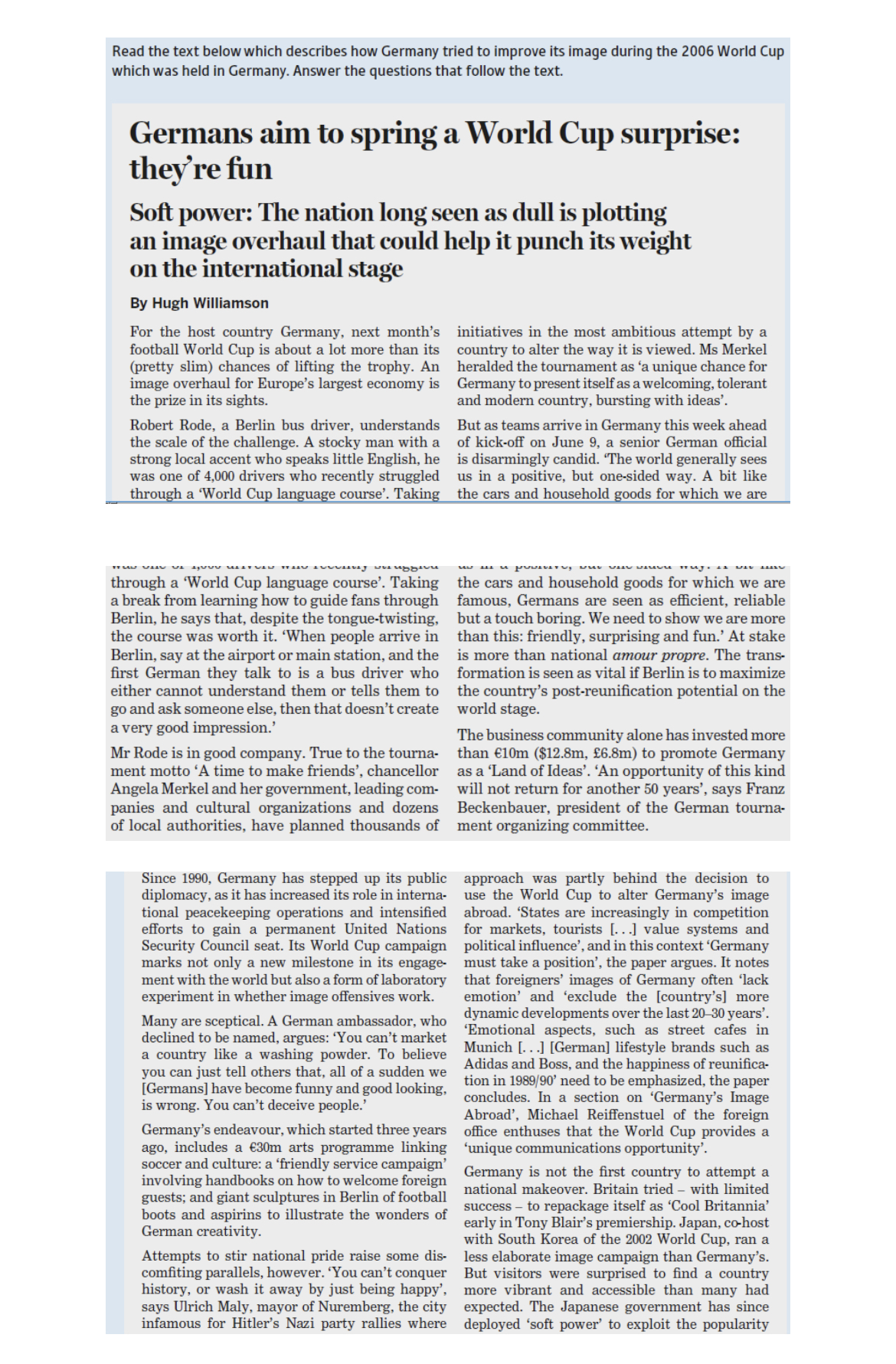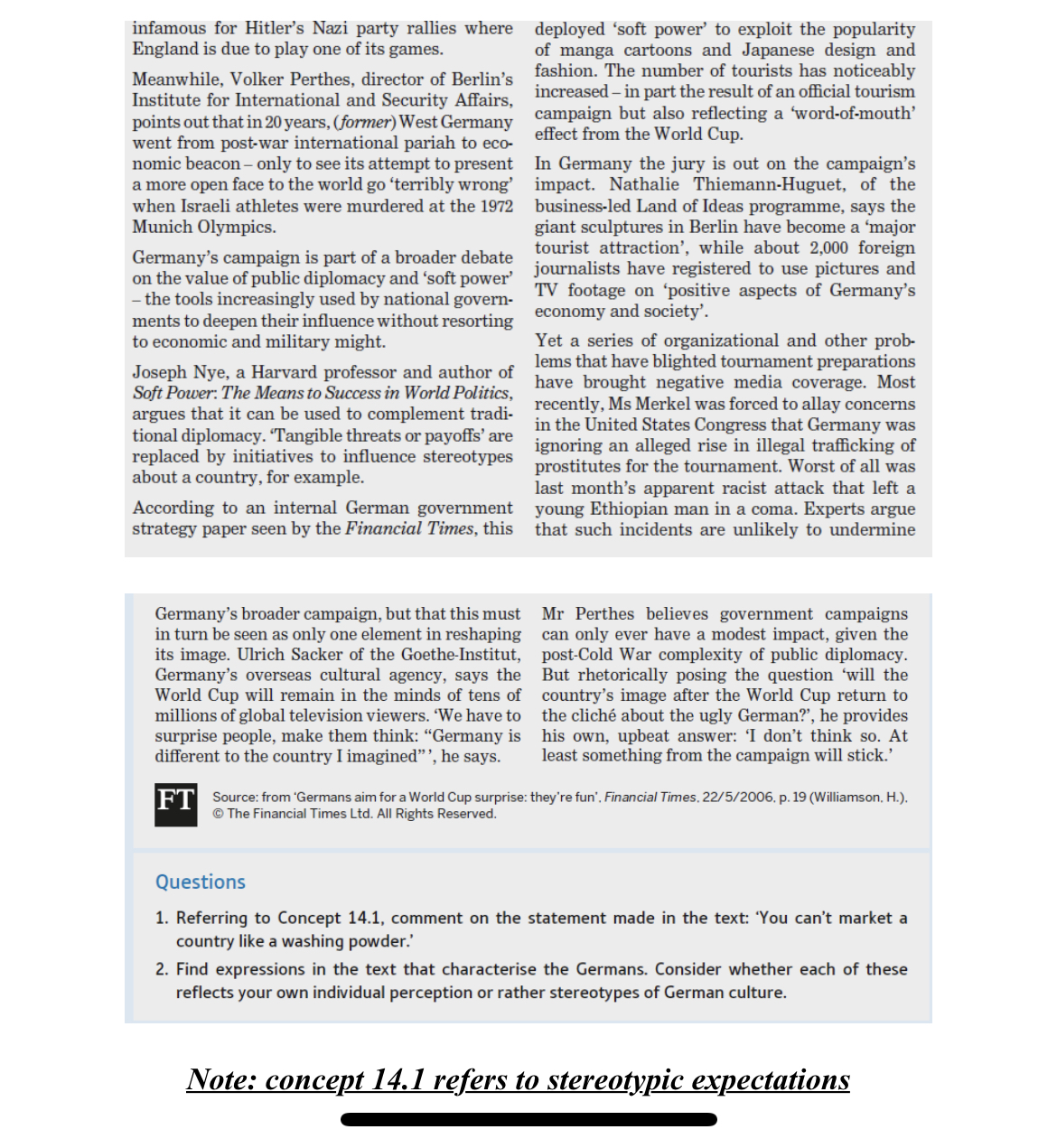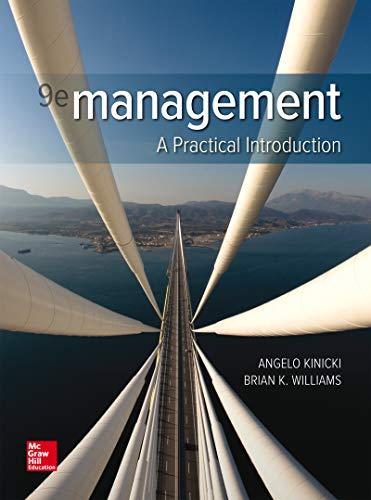Read the text below which describes how Germany tried to improve its image during the 2006 World Cup which was held in Germany. Answer the questions that follow the text. Germans aim to spring a World Cup surprise: they're fun Soft power: The nation long seen as dull is plotting an image overhaul that could help it punch its weight on the international stage By Hugh Williamson For the host country Germany, next month's initiatives in the most ambitious attempt by a football World Cup is about a lot more than its country to alter the way it is viewed. Ms Merkel (pretty slim) chances of lifting the trophy. An heralded the tournament as 'a unique chance for image overhaul for Europe's largest economy is Germany to present itself as a welcoming, tolerant the prize in its sights. and modern country, bursting with ideas'. Robert Rode, a Berlin bus driver, understands But as teams arrive in Germany this week ahead the scale of the challenge. A stocky man with a of kick-off on June 9, a senior German official strong local accent who speaks little English, he is disarmingly candid. 'The world generally sees was one of 4,000 drivers who recently struggled us in a positive, but one-sided way. A bit like through a World Cup language course'. Taking the cars and household goods for which we are through a 'World Cup language course'. Taking the cars and household goods for which we are a break from learning how to guide fans through famous, Germans are seen as efficient, reliable Berlin, he says that, despite the tongue-twisting, but a touch boring. We need to show we are more the course was worth it. 'When people arrive in than this: friendly, surprising and fun.' At stake Berlin, say at the airport or main station, and the is more than national amour propre. The trans- first German they talk to is a bus driver who formation is seen as vital if Berlin is to maximize either cannot understand them or tells them to the country's post-reunification potential on the go and ask someone else, then that doesn't create world stage. a very good impression.' Mr Rode is in good company. True to the tourna- The business community alone has invested more ment motto 'A time to make friends', chancellor than e10m ($12.8m, $6.8m) to promote Germany as a 'Land of Ideas'. 'An opportunity of this kind Angela Merkel and her government, leading com- will not return for another 50 years', says Franz panies and cultural organizations and dozens Beckenbauer, president of the German tourna- of local authorities, have planned thousands of ment organizing committee. Since 1990, Germany has stepped up its public approach was partly behind the decision to diplomacy, as it has increased its role in interna- use the World Cup to alter Germany's image tional peacekeeping operations and intensified abroad. 'States are increasingly in competition efforts to gain a permanent United Nations for markets, tourists [. . .] value systems and Security Council seat. Its World Cup campaign political influence', and in this context 'Germany marks not only a new milestone in its engage- ment with the world but also a form of laboratory must take a position', the paper argues. It notes that foreigners' images of Germany often 'lack experiment in whether image offensives work. emotion' and 'exclude the [country's] more Many are sceptical. A German ambassador, who dynamic developments over the last 20-30 years'. declined to be named, argues: 'You can't market Emotional aspects, such as street cafes in a country like a washing powder. To believe Munich [. . .] [German] lifestyle brands such as you can just tell others that, all of a sudden we Adidas and Boss, and the happiness of reunifica [Germans] have become funny and good looking, tion in 1989/90' need to be emphasized, the paper is wrong. You can't deceive people.' concludes. In a section on 'Germany's Image Germany's endeavour, which started three years Abroad', Michael Reiffenstuel of the foreign ago, includes a 630m arts programme linking office enthuses that the World Cup provides a soccer and culture: a 'friendly service campaign' 'unique communications opportunity'. involving handbooks on how to welcome foreign Germany is not the first country to attempt a guests; and giant sculptures in Berlin of football national makeover. Britain tried - with limited boots and aspirins to illustrate the wonders of success - to repackage itself as 'Cool Britannia' German creativity. early in Tony Blair's premiership. Japan, co-host with South Korea of the 2002 World Cup, ran a Attempts to stir national pride raise some dis- less elaborate image campaign than Germany's. comfiting parallels, however. 'You can't conquer history, or wash it away by just being happy', But visitors were surprised to find a country more vibrant and accessible than many had says Ulrich Maly, mayor of Nuremberg, the city expected. The Japanese government has since infamous for Hitler's Nazi party rallies where deployed 'soft power' to exploit the popularityinfamous for Hitler's Nazi party rallies where deployed 'soft power' to exploit the popularity England is due to play one of its games. of manga cartoons and Japanese design and Meanwhile, Volker Perthes, director of Berlin's fashion. The number of tourists has noticeably Institute for International and Security Affairs, increased - in part the result of an official tourism points out that in 20 years, (former) West Germany campaign but also reflecting a 'word-of-mouth' went from post-war international pariah to eco- effect from the World Cup. nomic beacon - only to see its attempt to present In Germany the jury is out on the campaign's a more open face to the world go 'terribly wrong' impact. Nathalie Thiemann-Huguet, of the when Israeli athletes were murdered at the 1972 business-led Land of Ideas programme, says the Munich Olympics giant sculptures in Berlin have become a 'major Germany's campaign is part of a broader debate tourist attraction', while about 2,000 foreign on the value of public diplomacy and 'soft power' journalists have registered to use pictures and - the tools increasingly used by national govern- TV footage on 'positive aspects of Germany's ments to deepen their influence without resorting economy and society'. to economic and military might. Yet a series of organizational and other prob- Joseph Nye, a Harvard professor and author of lems that have blighted tournament preparations Soft Power: The Means to Success in World Politics, have brought negative media coverage. Most argues that it can be used to complement tradi- recently, Ms Merkel was forced to allay concerns tional diplomacy. 'Tangible threats or payoffs' are in the United States Congress that Germany was replaced by initiatives to influence stereotypes ignoring an alleged rise in illegal trafficking of about a country, for example. prostitutes for the tournament. Worst of all was last month's apparent racist attack that left a According to an internal German government young Ethiopian man in a coma. Experts argue strategy paper seen by the Financial Times, this that such incidents are unlikely to undermine Germany's broader campaign, but that this must Mr Perthes believes government campaigns in turn be seen as only one element in reshaping can only ever have a modest impact, given the its image. Ulrich Sacker of the Goethe-Institut, post-Cold War complexity of public diplomacy. Germany's overseas cultural agency, says the But rhetorically posing the question will the World Cup will remain in the minds of tens of country's image after the World Cup return to millions of global television viewers. 'We have to the cliche about the ugly German?', he provides surprise people, make them think: "Germany is his own, upbeat answer: "I don't think so. At different to the country I imagined"', he says. least something from the campaign will stick.' FT Source: from 'Germans aim for a World Cup surprise: they're fun'. Financial Times. 22/5/2006. p. 19 (Williamson. H.). The Financial Times Ltd. All Rights Reserved. Questions 1. Referring to Concept 14.1, comment on the statement made in the text: 'You can't market a country like a washing powder." 2. Find expressions in the text that characterise the Germans. Consider whether each of these reflects your own individual perception or rather stereotypes of German culture. Note: concept 14.1 refers to stereotypic expectations








